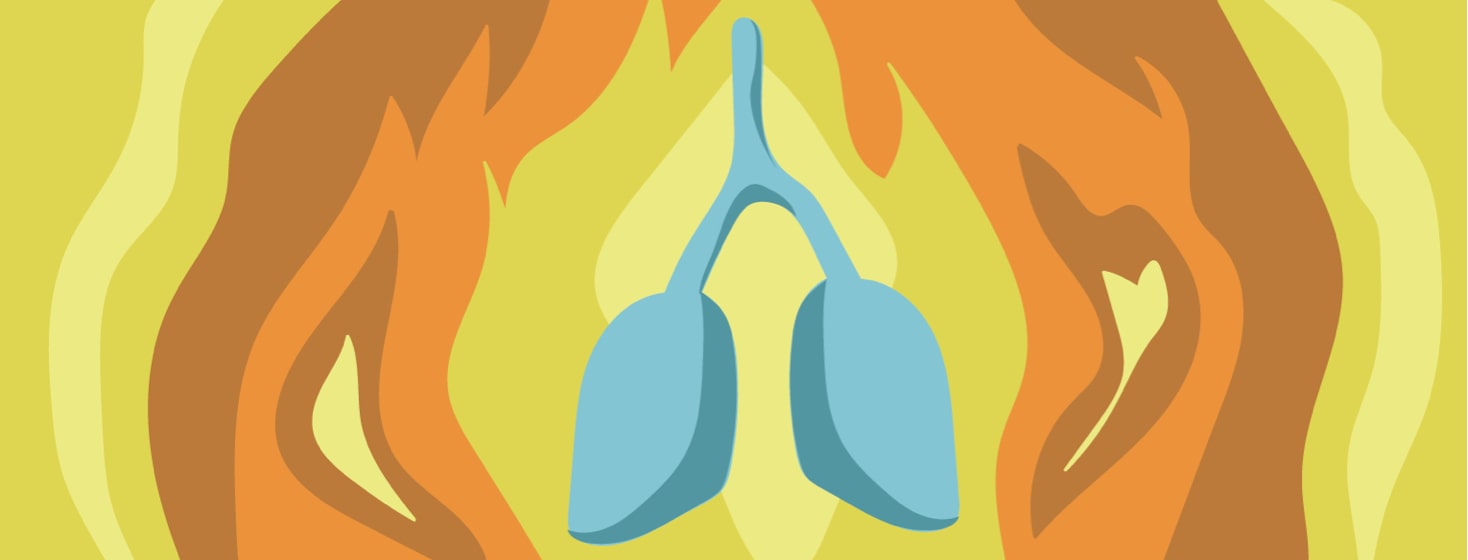The Impact of Wildfires on People with Asthma
What makes its way into the air we breathe concerns most, if not all of us. Airborne viruses that cause illness remain at the forefront of many of our thoughts. Also top of mind for a lot of people are wildfires, which can quickly pollute the air and cause breathing problems.
Bigger, stronger wildfires are burning throughout the world more and more often. These scorching dangers ensue from droughts and other land and weather conditions. Being aware of the risks and effects of wildfires helps to address this growing threat to our health and life.1
Wildfires, health risks, and chronic lung disease
The air we breathe is essential for not only living but also living well. Breathing keeps us alive. What and how we breathe affects how well we function and enjoy daily life.
Wildfires and other air hazards could pose greater risks for people with chronic lung illnesses. Those with asthma already have trouble breathing. Wildfires that affect air quality can make routine actions such as breathing, speaking, and walking harder to do.
How wildfires change air quality
Wildfires alter the quality of the air. All the changes in the air can be hard to measure and predict. This is because wildfires vary based on what burns and for how long. But the main impact is a reduction in air quality.2
One common aspect of all wildfires is that they create tiny particles known as fine particulate matter (PM). Due to the small size, this PM can spread through the air and across far distances. These bits can also make their way farther into people’s airways and lungs than larger particles do.2
The particles in wildfire smoke can be toxic on their own or when they mix with something else. For instance, dust can make the air hard to breathe and see through. Other compounds can even give rise to harmful ozone in the air. When inhaled, PM from wildfire smoke can irritate and damage the lungs and throat.2
How wildfires affect people with asthma
The smoke from wildfires can trigger or worsen asthma. PM from the smoke can inflame the lungs. This often leads to shortness of breath. Since these symptoms already exist with asthma, they can become severe when a person with asthma encounters wildfire smoke.2
Studies show that wildfire smoke can increase the need for asthma treatments and emergency room (ER) visits. Treatments often consist of inhalers with drugs that either open the airways or reduce inflammation in the lungs. In some cases, asthma can get so severe that a person needs advanced urgent care in an ER or hospital to raise their blood oxygen levels.2
A 2013 study found that wildfires that blazed in Southern California in October and November of 2007 led to extra ER visits for people in the area. One area ER had 1.5 more daily visits for asthma. The study also reported more than 3 added visits each day for shortness of breath. During this time, nearly 3 people received a new asthma diagnosis per day.3
Research into a 2008 wildfire in North Carolina also revealed higher numbers of ER visits for lung illnesses. The number of visits for asthma rose by 66 percent. The highest increase took place on the day people with asthma first breathed in wildfire smoke.4
The North Carolina wildfire study also found that certain people with asthma fared more poorly than others. Financial and social factors seemed to have some bearing on these outcomes. Those with a higher chance of asthma problems after exposure to wildfire smoke had lower socioeconomic status.4
What you can do when wildfires are close
Staying connected with your doctor is vital if you have a chronic illness like asthma. Prevention is key – keep enough asthma medicine on hand before an event. Keep a 7- to 10-day supply in a waterproof container you can easily grab if you need to leave your home quickly.5
Monitor air quality during a wildfire and stay indoors when possible to avoid added exposure.5
Follow your asthma action plan during nearby wildfire events. Seek immediate help with increased shortness of breath, coughing that does not stop, or other symptoms that do not go away.5
If you must leave your home and seek shelter because of a wildfire, make sure shelter officials know you or your child has asthma.5
Wildfires are not going away. Living with asthma or having a child with asthma means taking extra steps to ensure you or your child are as healthy as possible during these events. Keep in touch with your doctor and follow your asthma action plan. With a little preparation and planning, you can increase your ability to be prepared for these disasters.

Join the conversation